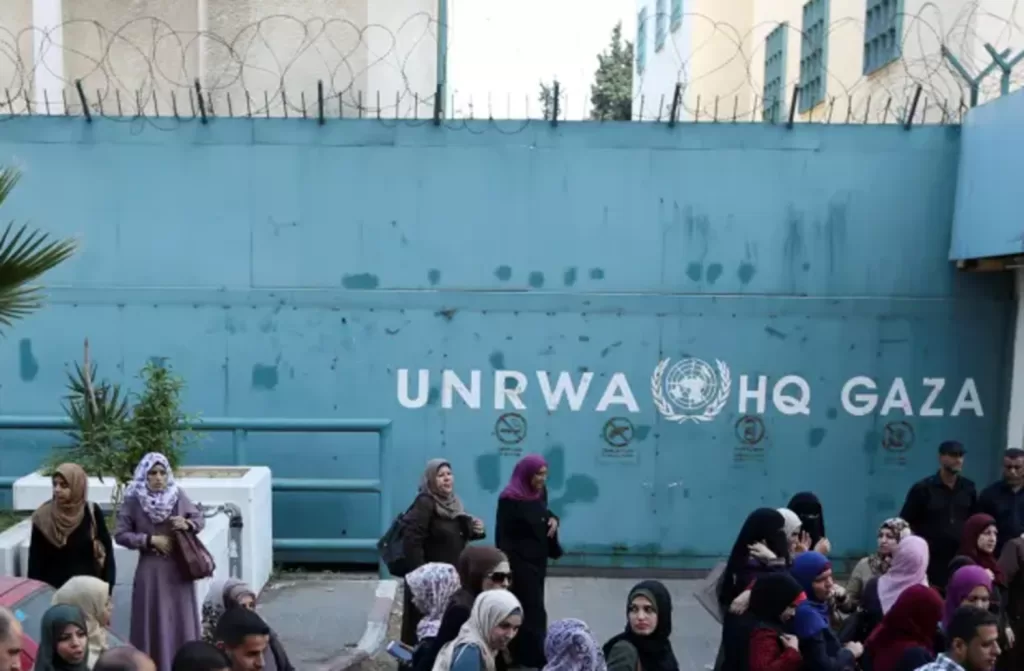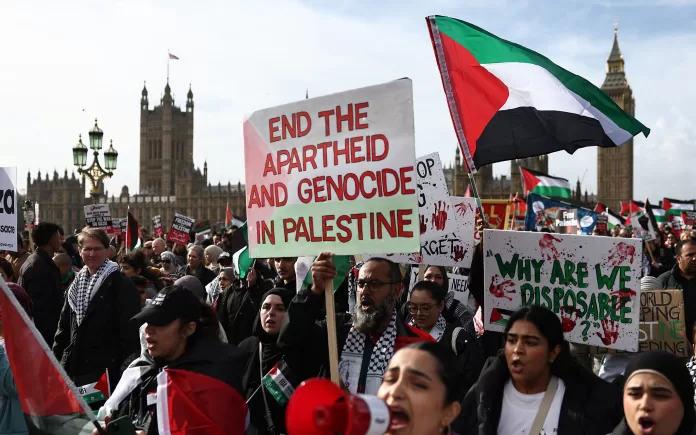The recent escalation of conflict in the Gaza Strip has brought about a humanitarian crisis of staggering proportions. Key to this tragedy are the Israeli air raids that have devastated educational and medical facilities, culminating in a substantial loss of civilian life, including many women and children. The Israel war against Palestine has once again plunged the region into a devastating cycle of violence, causing immense suffering and loss of life. The ongoing genocide of Palestinian has resulted in an unprecedented level of casualties, leaving countless lives shattered and upended. The most alarming aspect of this conflict is the rising number of civilian casualties; sadly, children make up over a third of those killed, and many victims are still under the debris. Unimaginable suffering, dispossession, and further displacement await millions of Palestinians due to Israel’s tighter siege has prevented the entry of necessities like food, gasoline, and water, the situation in Gaza has gotten out of control. As a result, more than 2 million people in the Gaza Strip are fighting for their lives. If the violence doesn’t stop right away, the humanitarian crisis brought on by Israel’s illegal 16-year blockade of Gaza will only become worse.
Recent Developments
In a harrowing series of events, Israeli airstrikes targeted Al Fakhoura school and Tall az-Zaatar, both run by the United Nations Relief and Works Agency (UNRWA) in the Jabalia refugee camp in northern Gaza. The attack on Al Fakhoura alone resulted in at least 50 deaths, as reported by the Palestinian Ministry of Health. The air raids have inflicted severe destruction, rendering these havens of learning and refuge into scenes of horror and despair. Hani Mahmoud reporting for Al Jazeera from Khan Younis described the attacks as part of a disturbing trend targeting schools, hospitals, and public facilities.
The onslaught has forced many Palestinians to flee their homes, seeking shelter in UN-run schools near the Indonesian Hospital. Yet, even these supposed sanctuaries have not been spared. Tareq Abou Azzoum, another Al Jazeera reporter, highlighted the dire situation at Al Fakhoura school, with dead bodies scattered across the site and medical teams struggling to evacuate the wounded.
Pakistan’s Stance
Pakistan has strongly condemned the ongoing situation in Gaza, labeling it as “Genocide.” Pakistan’s Foreign Office emphasized the dire need for a ceasefire to halt the escalating civilian casualties. The statement released on X highlighted the tragic toll of the conflict: over 10,000 Palestinian deaths. Pakistan’s stance is rooted in its long-standing position of not recognizing Israel and advocating for an independent Palestinian state with pre-1967 borders and Al-Quds Al-Sharif (Jerusalem) as its capital.
Global Protests and Public Sentiment
The genocide has sparked a wave of international protests, demonstrating widespread public disquiet over the rising civilian toll and the destruction in Gaza. Tens of thousands of pro-Palestinian demonstrators took to the streets in major cities worldwide, including Washington, Milan, Paris, Istanbul and definitely in Arab states as well.
These protests, particularly notable in countries with significant Muslim populations like the U.S., U.K., and France, have seen participants voice their disillusionment with their governments’ perceived support of Israel amidst its bombardments in Gaza. The demonstrators’ calls for a halt to the violence echo a growing concern for the humanitarian impact of the conflict.
The United Nations Perspective
Further intensifying the call for action, Pakistan’s permanent representative to the United Nations, Ambassador Munir Akram, criticized what he described as the international order’s “Double and Triple standards.”
He pointed to this as the root of the crisis in the Middle East and urged the world to rectify the imbalance at the heart of the UN and the application of international law.
Appeals to the International Criminal Court (ICC)
Reporters Without Borders (RSF) submitted a complaint to the ICC on October 31, citing “war crimes committed against journalists in Israel and Palestine.” This complaint highlighted the death of nine journalists on October 7, 2023. The RSF also addressed the destruction of press organization premises in Gaza. This is the third such complaint by RSF to the ICC since 2018, demonstrating an ongoing concern for the safety of journalists in the conflict zone.
Furthermore, a collective complaint comprising a hundred jurists from various countries filed a complaint on November 8. This group, including members of the bar in Algeria and representatives of associations, led by French lawyer Gilles Devers, accuses Israel of “Genocide” in Gaza.
Three Palestinian organizations, Al-Haq, Al Mezan, and the Palestinian Centre for Human Rights filed a complaint on November 8 for “War Crimes,” “Apartheid,” “Genocide,” and “Incitement to genocide.” This complaint specifically references bombings in populated areas, the siege of Gaza, and the deprivation of essentials like food and water.

International Humanitarian Law Conventions
• The Geneva Conventions, comprising four treaties formulated in 1949, are fundamental to international humanitarian law. They primarily focus on the protection of individuals who are not participating in hostilities, including civilians, health workers, and aid workers.
• The Hague Conventions include several treaties and declarations from the late 19th and early 20th centuries, focusing on the laws and customs of war, specifically the means and methods of warfare.
• The Additional Protocols to the Geneva Conventions (1977) further detail the protections afforded to civilians, including the prohibition of indiscriminate attacks and the principle of proportionality.
War Crimes in Gaza
The Israeli Defense Forces (IDF) in Gaza are involved in war crimes by breaking the International Humanitarian Laws IHL in almost every form.
• Deliberately targeting civilians or civilian structures like homes, schools, and hospitals is prohibited. The reported attacks on children, women and unarmed civilians, and on UNRWA schools and medical facilities classified as war crimes.
• Indiscriminate attacks involves assaults that are not directed at a specific military objective or those that employ a method or means of combat which cannot be directed at a specific legitimate military target. The extensive aerial bombardment of densely populated areas in Gaza raises concerns over potential indiscriminate attacks.
• Disproportionate Use of Force, the principle of proportionality in international humanitarian law mandates that the anticipated military advantage from an attack must be balanced against the potential for civilian harm. Excessive civilian casualties or destruction of civilian infrastructure, compared to the achieved military advantage, may constitute a disproportionate use of force.
• Denial of Humanitarian Access, impeding humanitarian access to populations in need, including restrictions on essential supplies like food, medical supplies, and fuel, can be classified as a war crime under certain circumstances.
Collective Responsibility
This principle underscores that nations and their leaders, along with international organizations, share a responsibility to uphold human rights and international law. The genocide in Gaza is not just a regional issue; it’s a global concern, highlighting the interconnectedness of our world. The devastating human toll calls for a collective, humane response to conflict resolution, recognizing that every action has far-reaching implications.
Urgent Need for Ceasefire and Peace Talks
Continued hostilities only deepen the humanitarian crisis and make the path to peace more arduous. History has shown that military solutions alone cannot resolve deeply entrenched political conflicts. A renewed focus on peace talks, grounded in mutual respect and a genuine commitment to finding long-term solutions, is imperative. As former UN Secretary-General Ban Ki-moon once stated, “Negotiations may be painstaking, but they are the only way to a comprehensive and sustainable peace. “This crisis calls for a concerted international effort to address the immediate humanitarian needs in Gaza and hold accountable those who violate international laws.
Providing medical aid, ensuring food security, and rebuilding infrastructure are immediate priorities. In the longer term, there must be a robust international mechanism to investigate allegations of war crimes and ensure justice for victims. The words of a local resident in Gaza, who lamented, “We are trapped in an endless cycle of fear and despair,” echo the urgent need for change.





